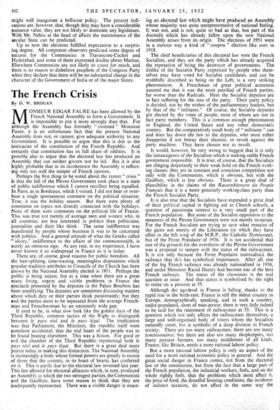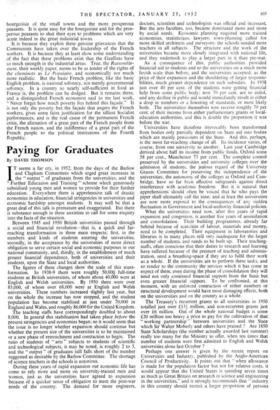The French Crisis
By D. W. BROGAN
ONSIEUR EDGAR FAURE has been allowed by the French National Assembly to form a Government. It is impossible to put it more strongly than that. For although the Assembly has formally " invested " Monsieur Faure, it is an unfortunate fact that the present National Assembly does not, or cannot, give adequate authority to any Government. It is possible to argue that this is due to the intricacies of the constitution of the Fourth Republic. And certainly that constitution has its full share of oddities. It is possible also to argue that the electoral law has produced an Assembly that can neither govern nor be led. But it is also highly probable that in its incoherence the Assembly is reflect- ing only too well the temper of French opinion.
Perhaps the first thing to be noted about the recent " crisis " is that the fall of the Pleven Government took place in a state of public indifference which I cannot recollect being equalled. In Paris, as in Bordeaux, which I visited, I did not hear or over- . hear a single spontaneouS comment on the political situation. True, it was the holiday season. But there were plenty of comments on topics not directly connected with the holidays. None of them were comments on the political life of France. This was true not merely of average men and women who, in all countries, are less interested in politics than politicians, journalists and their like think. The same indifference was manifested by people whose business it was to be concerned with politics. And a general attitude of what the Greeks called " idiocy," indifference to the affairs of the commonwealth, is surely an ominous sign. At any rate, in my experience, I have never known it so widespread in France as it is today.
There are, of course, good reasons for public boredom. All the hair-splitting, time-wasting, meaningless disputation which popular tradition attributes to Councils of the Church has been shown by the National Assembly elected in 1951. Perhaps the public is being unjust, but at a time when there are a great many living, urgent and visible problems in France the spectacle presented by the deputies in the Palais Bourbon has been unedifying. The deputies are sometimes discussing matters about which they or their parties think passionately; but they and the parties seem to be separated from the average French- man and Frenchwoman by an ominously wide gap.
It used to be, in what now look like the golden days of the Third Republic, common tactics of the. Right to distinguish between le pays reel and le pays legal. The implication was that Parliament, the Ministers, the republic itself were somehow accidental; that the real heart of the people was to be found beating elsewhere. This was a fiction. For good or evil the chamber of the Third Republic represented both le pays reel and le pays legal. But there is a great deal more justice today in making this distinction. The National Assembly is increasingly a body whose formal powers are greatly in excess of those that the country, in its heart of hearts, has conferred on it. This is partly due to the electoral law invented last year. This law allowed for electoral alliances which, in turn, produced an Assembly in which the two strongest parties, the Communists and the Gaullists, have some reason to think that they are inadequately represented. There was a visible danger in enact- ing an electoral law which might have produced an Assembly whose majority was quite unrepresentative of national feeling. It was not, and is not, quite so bad as that, but part of the discredit which has already fallen upon the new National Assembly arises-from its origin. The elections of 1951 were in a curious way a kind of " coupon " election like ours in 1918.
The chief beneficiaries of this electoral law were the French Socialists, and they are the party which has already acquired the reputation of being the destroyer of governments. The dislike of the Socialist Party expressed by people who them- selves may have voted for Socialist candidates, and can be truthfully described as being on the Left, is a very striking phenomenon. A Frenchman of great political acuteness assured me that it was the most petrified of French parties, far worse than the Radicals. Here the Socialist deputies are in fact suffering for the sins of the party. Their party policy is decided, not by the wishes of the parliamentary leaders, but by that of the " militants." Of course, the Socialist deputies got elected by the votes of people, most of whom are not in fact party members. This is a common enough phenomenon in England, the United States and any other democratic country. But the comparatively small body of militants " can and does lay down the law to the deputies, who must either disappoint if not betray their electors, or revolt against the party machine. They have chosen not to revolt.
It would, however, be very wrong to suggest that it is only the intransigence of the Socialists which is making stable French government impossible. It is true, of course, that the Socialists are clinging desperately to their weak hold on the French work- ing classes; they are in constant and conscious competition not only with the Communists, which is obvious, but with the Gaullists, which is less obvious. There is a great deal of plausibility in the claims of the Rassemblemetu du Peuple Francais that it is a more genuinely working-class party than the French Socialist Party.
It is also true that the Socialists have expended a great deal of their political capital in fighting aid to Church schools, a question of passionate interest to a very small part of the French population. But some of the Socialist opposition to the measures of the Pleven Government were not merely sectarian. For the French Socialists are trying to save what remains of the gains not merely of the Liberation (in which they have allies in the left wing of the M.R.P., the Catholic Democrats), but of the Front Populaire of 1936. It is not accidental that one of the grounds for the overthrow of the Pleven Government was a proposal to tamper with the status of the railwaymen. It is not only because the FrOnt Populaire nationalised the railways that this has symbolical importance. After all, one of the big French railways was already nationalised in 1936, and under Monsieur Raoul Dautry had become one of the best French railways. The status of the cheminots is the real question at issue. And that status is symbolised by the right to retire on a pension at 55.
Although the age-level in France is falling, thanks to the rapid rise in the birth-rate, France is still the oldest country in Europe, demographkcally speaking, and in such a country, under-populated, short of man-power, there is very little indeed to be said for the retirement of railwaymen at 55. This is a question which not only affects the railwaymen themselves, a large and well-organised body of voters whom the Socialists naturally court, but is symbolic of a deep division in French society. There are too many railwaymen; there are too many fonctionnaires; but there are also too many shopkeepers, too many peasant farmers, too many middlemen of all kinds. France, like Britain, needs a more rationaLlabour policy.
But a more rational labour policy is only an aspect of the need for a more rational economic policy in general. And the great social danger in France comes, not from the electoral law or the constitution, but from the fact that a large part of the French population, the industrial workers, feels, and on the whole rightly feels, that the problems which most affect it, the price of food, the dreadful housing conditions, the incidence of indirect taxation, do not affect in the same way the bourgeoisie of the small towns and the more prosperous peasants. It is quite easy for the bourgeoisie and for the pros- perous peasants to shut their eyes to problems which are very acute indeed in the great industrial towns.
It is because they exploit these genuine grievances that the Communists have taken over the leadership of the French workers. It is because they at least show some understanding of the fact that these problems exist that the Gaullists have so much strength in the industrial areas. True, the Rassemble- ment, their weekly paper, seems to be as tender of the rights of the cheminots as Le- Populaire, and economically not much more realistic. But the basic French problem, like the basic English problem, is national solvency, not merely governmental solvency. In a country so nearly self-sufficient in food as France is, the problem can be dodged. But it remains there, and a distinguished French economist said to me last week, " Never forget how much poverty lies behind this facade." It is not only the poverty but the facade that angers the French workers, gives some faint justification for the silliest Socialist performances, and is the real cause of the permanent French crisis, the alienation of a great part of the French people from the French nation, and the indifference of a great part of the French people to the political institutions of the Fourth Republic.



































 Previous page
Previous page